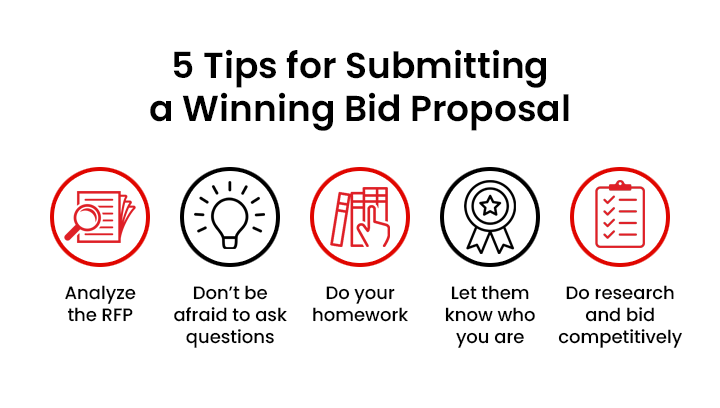
The best way to become a successful bidder is through experience. You may not get it right on your first try but as you become more familiar with the process, you’ll become a seasoned bidder in no time. Whether you’re new to government bidding or not, there’s always room to improve how you go about submitting a winning bid. With trillions of dollars being awarded in government contracts each year, getting in on some of these lucrative opportunities could be a great way for your business to grow.
In this article we’ll discuss five tips for submitting a winning bid.

Tip #1: Analyze the RFP
Before you start writing your bid proposal you want to make sure you’ve thoroughly read through the RFP and understand everything that’s being asked of you. Don’t just read through the specifications, although that’s very important, there’s a lot more detailed information that’s incredibly important to the actual bid itself such as, the delivery date, any deadline dates, mandatory walkthroughs, and of course the rules and regulations of the bid process. Many times, you will also find attached documents with further information about the goods or services being requested. You want to make sure your bid response includes everything the agency asks of you, whether it’s information about certain items, including specific forms or providing details about the work that is to be completed.
You also want to make sure your proposal is competitive, you don’t want to overprice, but you also don’t want to undersell yourself either. By being thorough and reading the bid documents in their entirety, it’ll help you assess whether your business has the resources to complete the project or not. If you don’t believe you can complete exactly what’s being asked of you in the RFP, it’s best not to bid on the opportunity and keep looking for something that your business will be able to handle. This will help you out in the long run and allow you to go after more bids in the future and be successful working in the public sector.
Tip #2: Don’t be Afraid to Ask Questions
During the bidding process some questions may arise about the bid itself or the work that needs to be completed. It’s not a bad thing to ask questions and get clarity on certain aspects of the bid. Many RFP’s have a question-and-answer deadline for you to submit questions, the agency will then publicly respond to these questions for all suppliers to review. By asking questions it shows you’ve taken the time to read through the RFP and would like a clearer understanding of what is being asked to put together your best proposal.
Tip #3: Do Your Homework
Researching the agency who’s issuing the RFP can also be an important step to submit a winning bid. Finding out information like what are their goals, challenges, and history, along with who are their leaders, partners, decision makers, and other companies they’ve worked with can really make your bid stand out. It shows you care and took the time to figure out how your business can provide the agency with what they need and help to fulfill everything they’re asking for. Don’t forget that each proposal you write should be unique to the agency issuing the bid and what they are requesting. If you keep using the same exact information in every proposal you write and don’t personalize it to the client, there’s a higher chance your bid won’t stand out as much and may cost you the contract.
Tip #4: Let Them Know Who You Are
It’s important to tell your story when writing a proposal to show the client why they should pick your business over your competitors. Provide as much details as you can, include what sets you apart from others, describe your experience in the field, include samples of your work, portfolios, quotes and testimonials from satisfied clients, contact information for references, as well as including resumes for the employees who’d be working on the project. You want to show how your skills and experience are relevant to the client and why you’d be the best fit for the job. You don’t want to leave the client wondering about your experience or work ethic, if you lay it all out on the table, there’s a better chance you’ll be considered and be awarded the contract.
This is your time to shine and prove why you deserve to win.
Tip #5: Do Your Research & Bid Competitively
It’s also very important to do as much research as you can before bidding on an opportunity. One of the best ways to prepare your business is to view closed and awarded bids that are similar to the goods and services your business provides, especially from the agency you plan to work with. You will be able to see what the contract was awarded for, which of your competitors submitted a bid, and the bid price they provided. You’ll also be able to see the project documents and specifications, giving you a full view of what it would’ve been like to bid on that opportunity.
By viewing all this information, you can get an idea of whether you need to adjust your bidding strategy or pricing to make your proposal more competitive when you decide to bid on your next opportunity. Bidding competitively is very important. You should always evaluate your competition and what they can provide at what price, so you can write a more competitive bid. You don’t want to get priced out by your competition by submitting a bid that’s way higher than what all the others provide, because you will not be considered. Remember the agency is looking out for themselves, so if they can get what they need at a lower and fair price, they may go with your competitor.
Win More Contracts!
By taking these five tips into consideration, you’ll likely have a better chance of submitting more winning bids in the future. The bidding process can be overwhelming and stressful at times but that’s why using a comprehensive bidding service like Bidnet Direct can help you find and manage the bidding opportunities that match perfectly with your business, so you can spend more time writing winning proposals. Once you start gaining more experience and figuring out how to submit your best bids, there’s no reason why you shouldn’t be a viable contender in the bidding world.
Find Your Next Government Contract
Search Bids

